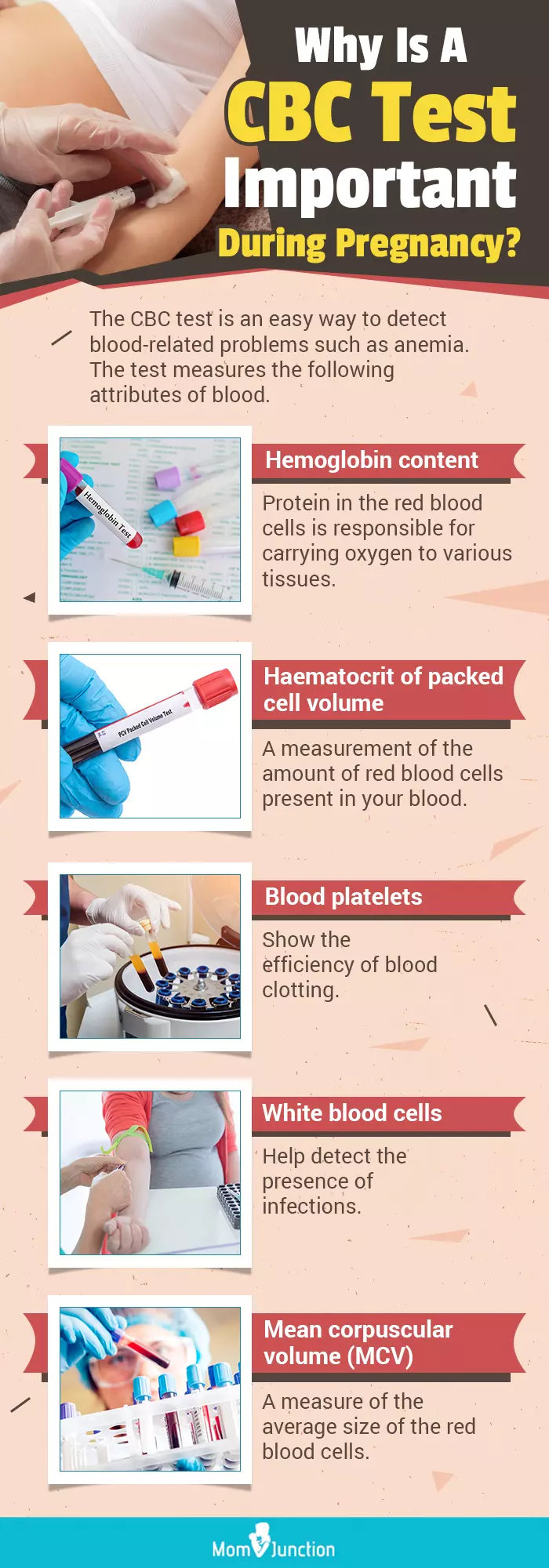
Image: ShutterStock
A complete blood count or CBC test during pregnancy assesses the full blood count in mothers and determines any underlying diseases and conditions. Doctors may order a CBC test for anemia screening and analyze the hemoglobin and hematocrit levelsiA blood test that calculates the percentage of red blood cells in the blood. during prenatal visits.
Although CBC tests are done in the early weeks, such as before 12 weeks of pregnancy, they are repeated a few times in the later weeks to ensure maternal wellbeing.
Read this post to learn more about CBC tests during pregnancy and how doctors interpret the results.
Key Pointers
- A CBC test is performed during pregnancy to examine the entire blood count.
- It can help detect underlying disorders and abnormalities.
- The test is specifically used to detect anemia and measure hematocrit and hemoglobin levels.
- A blood smear test is also done during pregnancy to check for conditions such as sickle cell disease, malaria, and leukemia.
Why Is CBC Blood Test During Pregnancy Needed?
A CBC test usually helps your doctor get a better idea of any illnesses you may be suffering from, and may also help him diagnose fatigue, weakness, infections and other deficiency conditions such as anemia. In fact, a CBC test is probably the first maternal blood test recommended during pregnancy.
A CBC test during pregnancy is required for several reasons including:
- Measurement of hemoglobin count.
- Measurement of haematocrit or packed cell volume.
 Quick fact
Quick fact- Measurement of blood platelets that play a role in blood clotting.
- The amount of individual white blood cells (monocytes, lymphocytes, neutrophils, basophils and eosinophils). These numbers could prove to be helpful in the detection of any infections whatsoever.
- The amount of red blood cells present in the blood which could help the early detection of any forms of deficiency (anemia).

Image: Shutterstock
In some cases, your doctor may also have a blood smear test done to rule out any possible conditions such as sickle cell disease, malaria, leukemia and other blood diseases.
CBC test is actually one of the simplest maternal blood tests carried out during pregnancy and is limited to merely drawing blood from the vein. There may be a small bruise at the site from where the blood is drawn, but the blood flow through the area usually stops in a couple of minutes.
Is It Really Essential During Pregnancy?
CBC test is one of the many important tests to be carried out during pregnancy. The American College of Obstetricians and Gynecologists believe that this test may also help detect anemia, after which, iron supplements can be given to improve the general health of the mother during pregnancy. According to the World Health Organization, the global prevalence of anemia among pregnant women is 36.5%.
The fact that this test helps early detection of many infections and other conditions that may prove to be harmful for the baby is what makes it even more important to be carried out during pregnancy.
 Research finds
Research findsOther Pregnancy Tests
Apart from CBC, these are several other important tests that you may need to undergo while you are pregnant.
- Blood type test (with Rh factor and antibody screening test)
- Rubella titer test
- Hepatitis BiA severe liver damage and infection caused by the Hepatitis B virus (HBV). test
- HIV test
- Syphilis test
- Glucose challenge test to detect gestational diabetes (1)
- Other tests, such as Chorionic Villus Sampling and amniocentesis, to detect chromosomal abnormalities (2)
- Pregnancy ultrasound
- Triple Screen to detect alpha-fetoprotein, hCG, and estriol (3)
- Quadruple Screen or Maternal Serum Screen for Down syndrome screening (4)

Image: Shutterstock
It is important to have your doctor’s opinion before undergoing any tests during this crucial period. Also make sure your doctor is aware of any medications or drugs you are already taking to rule out the risk of any complications (usually observed in individuals with bleeding disorders or those on blood thinning medications) associated with the test (5).
Frequently Asked Questions
1. How much hemoglobin is normal during pregnancy?
The normal range for hemoglobin levels during pregnancy ranges from 11.5 to 13.5 grams per deciliter (g/dl) (6).
2. Is 9.5 hemoglobin low during pregnancy?
Hemoglobin level below 11 g/dl is considered low during pregnancy (6).
3. How does pregnancy affect CBC?
In pregnancy, the total blood volume increases by about 1.5 liters, but the red blood cell parameters do not show significant changes. White blood cell count is found to increase while platelet count may decrease during pregnancy (usually in the third trimester) (7).
4. What is a ‘CBC with differential’ test?
A CBC test measures the total number of white cells. Whereas, a CBC with differential test reports the number of each type of these white blood cells in the blood sample (8).
5. How can I increase my hemoglobin during pregnancy?
Consuming iron-rich foods (meat, poultry, fish, eggs, dry beans, and grains with added iron), folic acid-rich foods (dry beans, dark leafy greens, wheat germ, and orange juice), and vitamin C-rich foods (citrus fruits and fresh, raw vegetables) can increase the hemoglobin count during pregnancy. In addition, you may also cook in cast iron pots and take prenatal multivitamins to raise your hemoglobin levels (9).
6. Why is hemoglobin low in pregnancy?
Low hemoglobin count during pregnancy is a result of increased blood volume. Inadequate intake of iron, vitamin B12, or folic acid in pregnancy are other factors that contribute to low hemoglobin levels (10).
A CBC test during pregnancy is one of the most basic maternal blood tests, requiring simply the use of a syringe to collect blood from a vein. The test evaluates a mother’s whole blood count, which includes hemoglobin volume, hematocrit, WBCs, and RBCs, to diagnose any underlying disorders or abnormalities. It is usually done before the 12th week of pregnancy, although it can also be done any time during the pregnancy to check maternal health. If you develop a fever, exhaustion, weakness, or other symptoms during your pregnancy, your doctor may order a CBC test to determine the cause.
Infographic: Important Information Provided By The CBC Test
Blood is the medium through which the fetus gets oxygen and nutrients required for proper growth. A CBC test in early pregnancy helps doctors identify blood-related problems and the presence of infections that may harm the pregnant woman and her baby. The infographic below summarizes the parameters tested by the above-mentioned prenatal test.

Illustration: Momjunction Design Team
Illustration: Why Is A CBC Test During Pregnancy Is Needed?

Image: Stable Diffusion/MomJunction Design Team
References
- Glucose Tolerance Test.
https://americanpregnancy.org/healthy-pregnancy/pregnancy-health-wellness/glucose-tolerence-test/ - Chorionic Villus Sampling (CVS).
https://www.hopkinsmedicine.org/health/treatment-tests-and-therapies/chorionic-villus-sampling-cvs - Triple Screen Test.
https://americanpregnancy.org/prenatal-testing/triple-screen-test/ - First Trimester Screening
Nuchal Translucency and NIPT – Quad Screen. - Complete Blood Count (CBC) Test.
https://www.webmd.com/a-to-z-guides/complete-blood-count#1 - R. Huch; (1992); The critical hemoglobin/hematocrit value in obstetrics.
https://pubmed.ncbi.nlm.nih.gov/1284711/ - Surabhi Chandra et al.; (2012); Physiological Changes in Hematological Parameters During Pregnancy.
https://www.ncbi.nlm.nih.gov/pmc/articles/PMC3422383/ - Complete Blood Count (CBC).
https://medlineplus.gov/lab-tests/complete-blood-count-cbc/ - Anemia and Pregnancy.
https://www.ucsfhealth.org/education/anemia-and-pregnancy - Anemia During Pregnancy.
https://my.clevelandclinic.org/health/diseases/23112-anemia-during-pregnancy - Hematocrit Test.
https://medlineplus.gov/lab-tests/hematocrit-test/ - Mei Ma et al. (2020); Use of complete blood count for predicting preterm birth in asymptomatic pregnant women: A propensity score‐matched analysis.
https://www.ncbi.nlm.nih.gov/pmc/articles/PMC7439335/
Community Experiences
Join the conversation and become a part of our nurturing community! Share your stories, experiences, and insights to connect with fellow parents.
Read full bio of Dr. Deepti Gupta
Read full bio of shreeja pillai
Read full bio of Rebecca Malachi
Read full bio of Aneesha Amonz
















